
An American flag hung on the side of a barn and a country song about a working man played at Warren’s Backyard, a music venue, where on a searing summer evening, the Hood County Republicans met for an open bar and a silent auction to kick off the campaign season.
A school board candidate rallied her supporters. A precinct chair held court at the front door next to a storied basketball coach. The county commissioner — a local hero since 2019 when he shot and killed a gunman who had stormed a church — wiped sweat from beneath a brimmed hat and nodded to the faithful. When talk turned to political enemies, it wasn’t about Democrats, who are scarce here, but of a far-right faction of fellow Republicans who have instigated a civil war within the party.

“I grew up with these people and they’re attacking me,” Robert Granger, the precinct chair, said of the ultraconservative wing of the party. “It’s getting worse. They want to break public education and go to school vouchers. It’s political grandstanding.” The self-described Reagan Republican added that local far-right meetings “felt like I was in a Pentecostal church. It’s Christian nationalism.”
The far-right movement in Hood County exemplifies the rancor and divisions that have reordered American politics and provoked a battle for the identity of the Republican Party. That fight in Congress plays out over immigration, reproductive rights and the war in Ukraine, but in this Texas region, where Donald Trump won 81% of the vote in 2020, it veers into skirmishes over multimillion-dollar school bonds, book banning and petty fights over septic tanks and overzealous constables. It is a seething tapestry of social media attacks, conspiracies, Bible quotes and name-calling under the maxim that all politics is local, if viscerally so.
“The infighting here is unbelievable,” said David Fischer, a religious conservative and former head of the county Republican Party, noting a recent court battle between traditionalists such as Granger and the far-right faction over the appointment of a district clerk. “That was the Republican Party suing itself. I was very upset by that.”
Hood County illustrates how Trump’s combative brand of politics is reshaping local — often rural — governments with consequences that will have lasting impact. The county seat in Granbury has been controlled by Republicans since Democrats began losing power in the decades following the 1964 Civil Rights Act. The region is a landscape of ranchers, tourists, gated communities and mobile homes that has become a litmus test for the hard right, including a county clerk’s decision in 2015 to defy a Supreme Court ruling by not granting a marriage license to a same-sex couple, and the arrest of Granbury lawyer Kellye SoRelle, who represented the radical Oath Keepers and pleaded guilty to obstruction of justice after the Jan. 6, 2021, insurrection at the Capitol.
“That’s how you take your government back,” SoRelle said in a video posted on social media as a mob swarmed Congress. “You literally take it back.”

Hood County feels “like the epicenter where a lot of these extreme right things got started. There’s a cultish nature to all of it,” said Christopher Tackett, a former board trustee for the Granbury Independent School District. His website See it. Name it. Fight it reports on campaign finances and the rise of Christian nationalism. The county’s traditional Republicans, he added, are religious conservatives but are more moderate than the extreme right-wing forces “that want a total elimination of the separation of church and state.”
This north-central plains region is one of the reddest parts of Texas. Hay blows from pickups and the guy behind the convenience store counter will smile kindly when you set down a six-pack. Steeples rise over neighborhoods, cattle graze on open fields and preachers profess God’s inimitable presence in a county that is about 94% white. Common questions are “What church do you attend?” and “Are you going to the football game?”
Republicans of all persuasions support Trump. But traditionalists are troubled by the rise of ultraconservatives and the influence of Christian billionaires in Texas who have spent millions of dollars on candidates across the state. The political shift started in part when the county, where the Brazos River flows into Lake Granbury, began attracting retirees and families escaping more liberal states, including California. The population grew from about 29,000 in 1990 to about 66,000 today. Some of the newer arrivals such as Steve Biggers, a transplant from Nashville and a tea party member, brought a brasher style of politics.
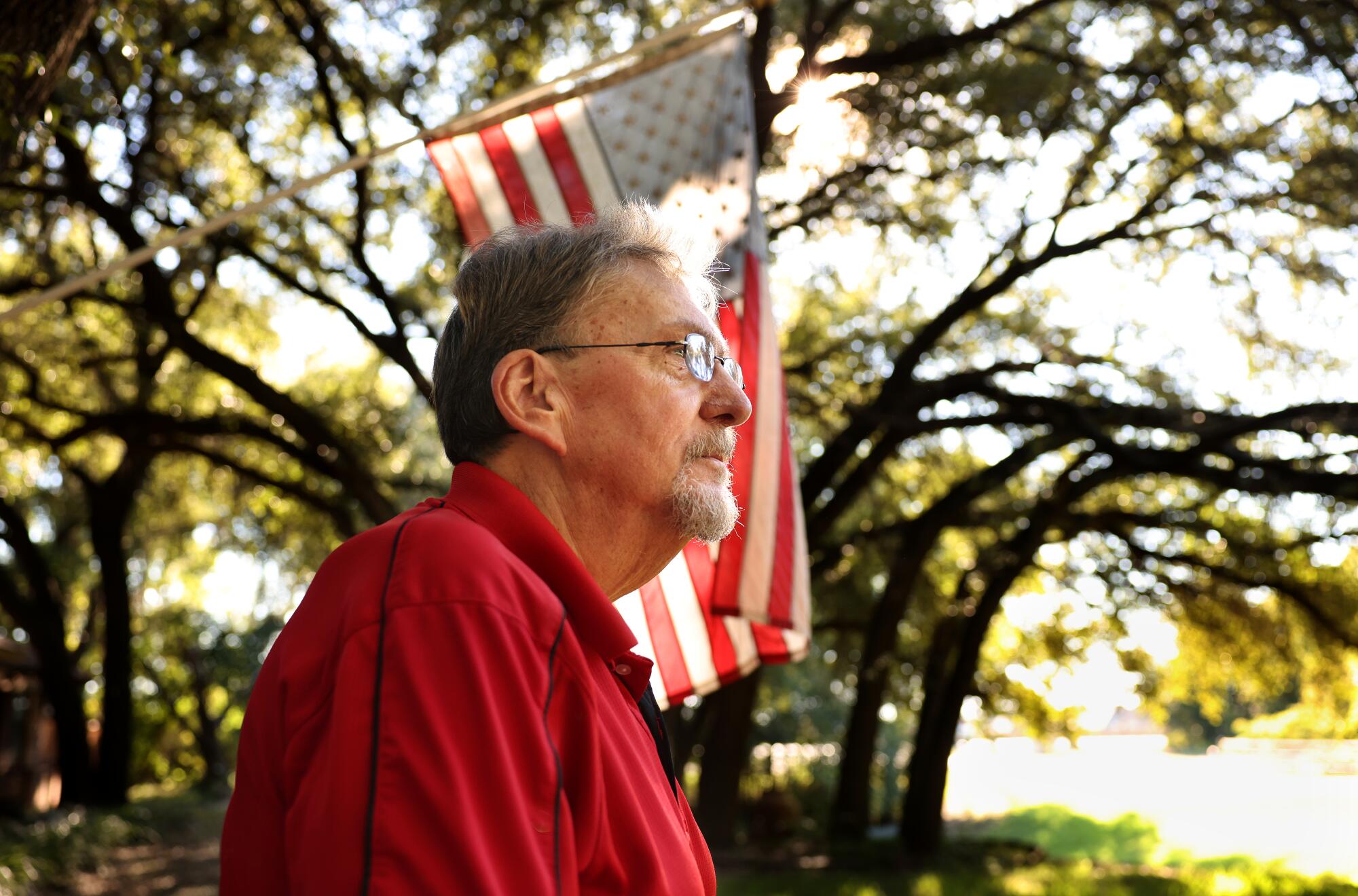
“I like to poke people,” said Biggers, sitting in the shade on a recent afternoon eating quiche at a restaurant, his cane, which helps him walk after a hip replacement, slanted on a chair. “I believe Trump brought a lot of this out. I know this is Texas, but I’m not a Bush fan. Trump is blunt and he speaks volumes. People have had enough of the establishment. I have to believe the hand of God works in everyone.”
A former chairman of the county’s Republican Party, Biggers began his fight with the local government shortly after he arrived in 2016. He insisted he had the right to maintain his own septic system, scoffing at a regulation that it be done by an approved firm. A judge ruled against him in a lawsuit but the requirement was later changed. Biggers led a campaign against COVID-19 restrictions, and he has three times been part of the opposition to block school construction and renovation bonds — one totaling about $394 million — to accommodate an increasing population.
“I went from the septic guy to the COVID guy. There’s been a target on my back,” said Biggers, whose grandchildren are home-schooled and whose wife teaches at a private Christian school. “The country is waking up to the growth and spectacle of what government has become. It’s not for the common people anymore. The government doesn’t need to be in my wallet.”

As sometimes happens in Hood County, local law enforcement, unintentionally or not, was drawn into a political dispute. Weeks before the final vote on the renovation bonds in May, Biggers was pulled over and cited for not having a current inspection sticker and other violations for an old school bus he had decorated with anti-bond signs. He said he was jailed for six hours and released. “The sheriff’s office was weaponized against me,” he said, suggesting without proof that the incident was retribution by forces favoring the school bond proposal.
The Granbury Independent School District is a battleground for much of the Republican infighting. The U.S. Education Department‘s Office of Civil Rights opened an investigation in 2022 after the superintendent — under pressure from far-right factions — directed librarians to remove books on sexuality and LGBTQ+-related themes from shelves. In a separate case, Chief Deputy Constable Scott London investigated school librarians on criminal charges for stocking books he considered obscene or inappropriate. London is a supporter of the Constitutional Sheriffs and Peace Officers Assn., which believes local sheriffs can refuse to enforce any law they believe to be unconstitutional.

The Hood County district attorney did not support London’s findings and no indictments were brought against the librarians.
School board trustee Courtney Gore said the book banning crusade was stitched into a broader far-right strategy to undermine public education in favor of taxpayer funded vouchers for students to attend private and Christian schools. Gore had co-hosted a local ultraconservative podcast, and she ran for the school board to defeat what she was told was a left-wing conspiracy to indoctrinate students on racial and sexuality-related issues. She found instead, she said, that Hood County was part of a statewide effort by billionaires, notably Tim Dunn, a west Texas oilman and big contributor to Trump, and Dan and Farris Wilks, who made their fortune in fracking, to remake society.
“There was no leftist agenda,” said Gore, who has disowned the far right. She added that the intent of ultraconservatives was to create dysfunction in the school district, which with its football team — the Pirates — is central to the town’s identity. “It was a concerted effort,” she said, “to hurt public education to get more people to support an alternative education system, such as vouchers.”
Dunn and the Wilks brothers are religious conservatives who for years have backed candidates in Texas legislative races that support a school voucher system endorsed by Gov. Greg Abbott. The Texas Tribune reported that the region’s former state Rep. Mike Lang received more than $600,000 in contributions through direct donations or PACs controlled by the billionaires. Lang once chaired the ultra-right Texas House Freedom Caucus. He is married to Katie Lang, the county clerk who refused a marriage license for a gay couple. The license was granted after the couple filed a lawsuit.
1
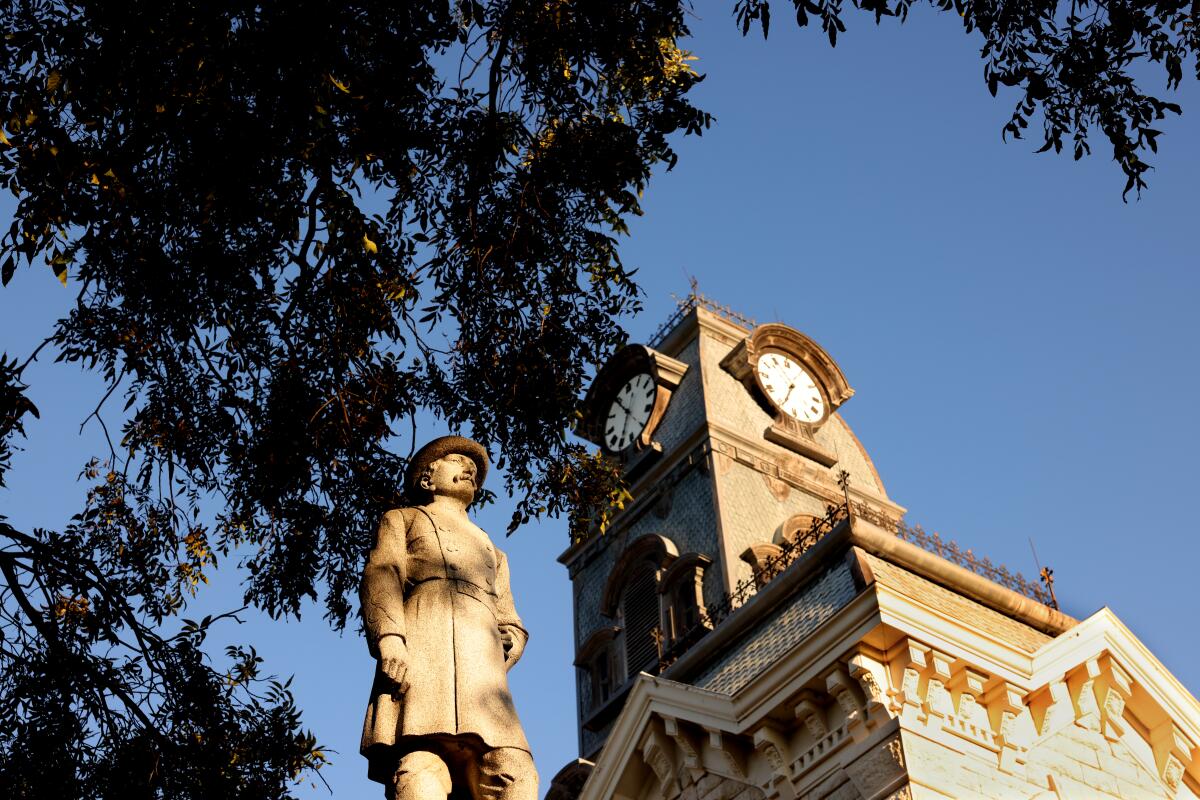
2
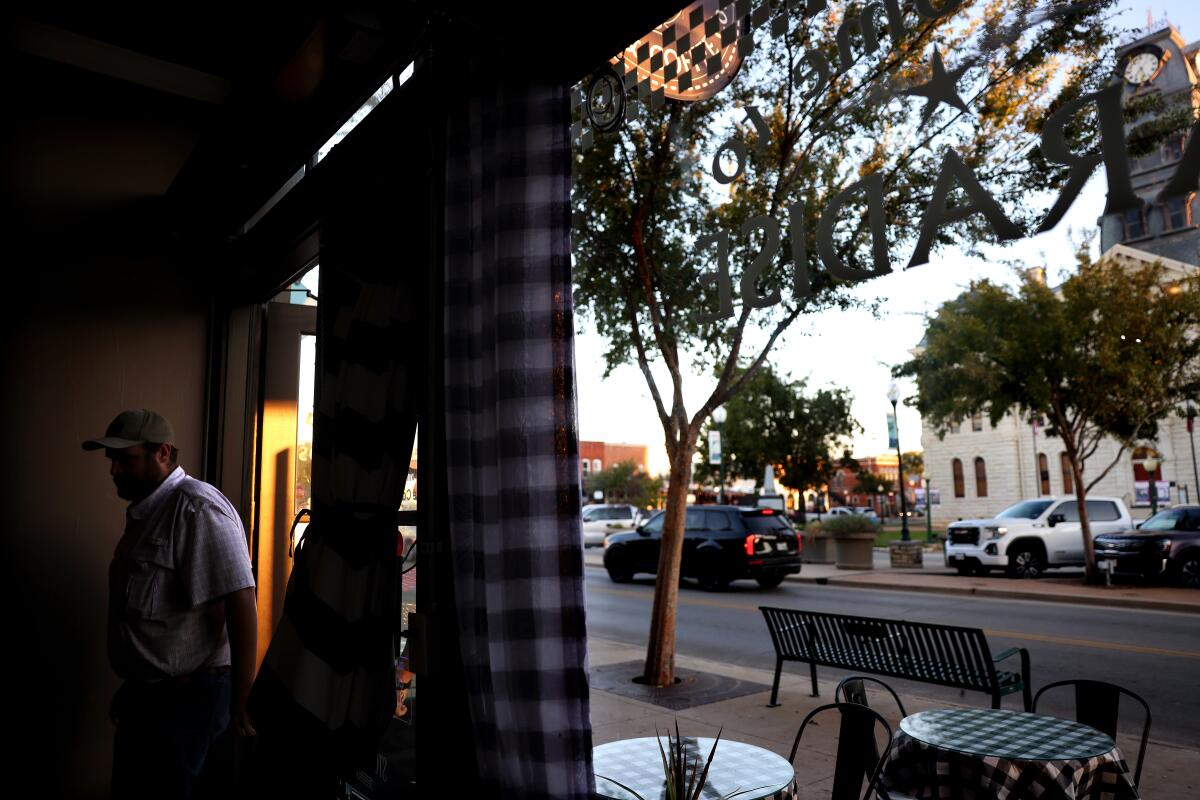
3
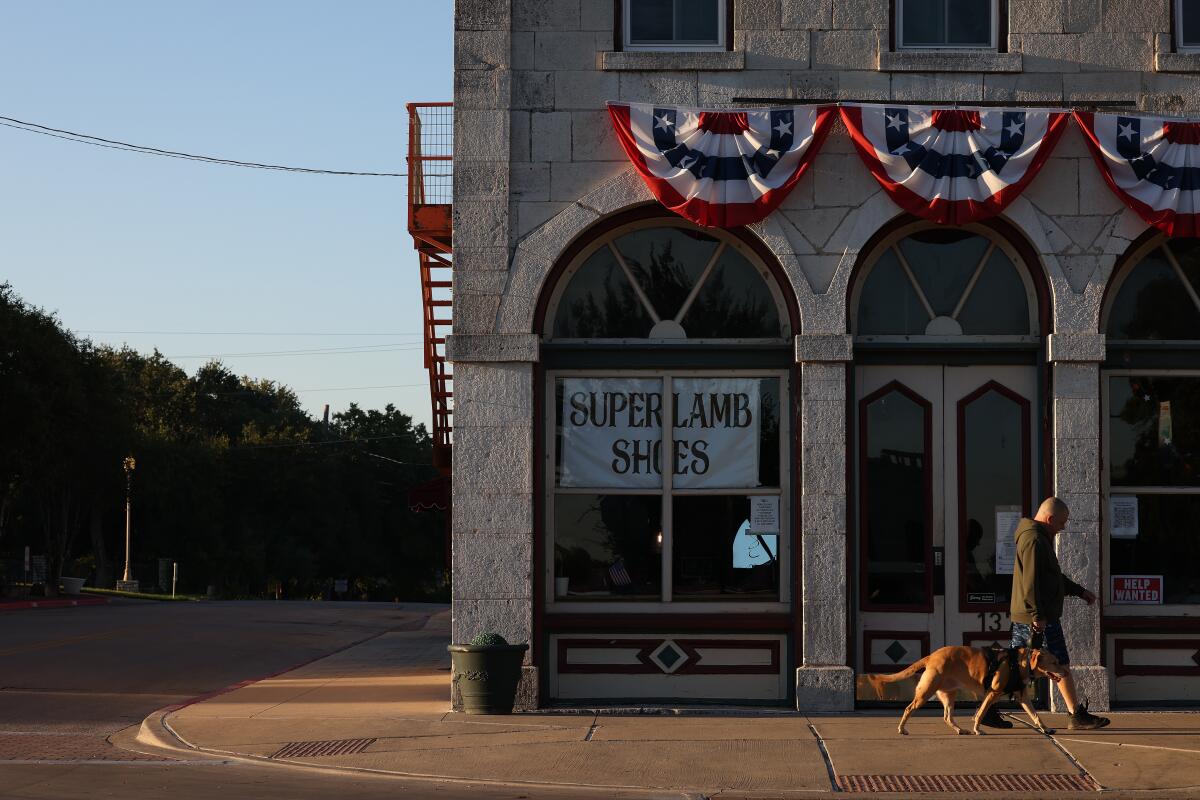
4

1.A statue of Gen. Hiram Bronson Granbury, a brigadier general in the Confederate Army, stands in the Historic Granbury Square beside the Hood County Courthouse.2.A customer enters Paradise Bistro & Coffee Co. in the Historic Granbury Square.3.A pedestrian and dog walk through the square.4.A group of men start Bible study with a prayer, including Bobby Don Shelton, 76, at Paradise Bistro & Coffee Co.
Tackett said Dunn and the Wilks brothers “have been drivers over the last decade pulling the state farther to the right. They have instilled fear in legislators.”
Hood County is named for Confederate Gen. John Bell Hood, whose monument stands beneath the courthouse tower clock in Granbury. Roads stretch from the town square past well-kept houses, shade trees, Trump signs and, farther out, to churches, a drive-in, and a cemetery, where legend and a gravestone suggest, but historians refute, outlaw Jesse James is buried. People from Fort Worth, about 45 miles away, once said driving to Granbury was like going to the country. But traffic these days on Route 377 has given the town more the air of a suburb than an outpost.

Dueling Facebook and social media pages, including Granbury Breaking News, are filled with slights and grievances between far-right Republicans — known as sharks — and moderates, referred to as whales. In one post a man attempted to determine which group of Republicans showed up at a political forum: “Who were they, the far right-wing nut job part of the tea party, regular tea party, or the newly found conservatives, how do you tell the difference, and how many actually live in the precinct.”
Allegiances are often cloaked in the vernacular of America’s founding patriots. Constable John Shirley is a former leader in the Oath Keepers, once saying that the extremist group founded by Stewart Rhodes, who lived in Granbury and was found guilty of sedition and sentenced to 18 years in prison for plotting the Jan. 6 riots, was “the last line of defense against tyranny.”

In 2017, Shirley posted on Twitter, under the name @LawDog_Emeritus, “Please join us on the Proud Boys DFW Facebook page. We’re trying to get an active group up.” Shirley, who did not respond to requests for an interview, has said he left the Oath Keepers in 2020. In June, he appeared at a public meeting to receive a certificate of appreciation from residents in his precinct.
A Harley growled through the town square the other day. A tattooed skateboarder clattered over sidewalks, and a man sat on a bench in the shade, reading the Bible and taking notes near the opera house where the musical “Oklahoma” was playing. It was approaching 100 degrees when Fischer, a retired aerospace worker, walked into the Paradise Bistro & Coffee Co., a cultural and political crossroads of sorts, and ordered a cappuccino. He mentioned the pecan plantation farther out of town and how local churches recently hosted 45 Israeli soldiers who were on a break from the war in Gaza.
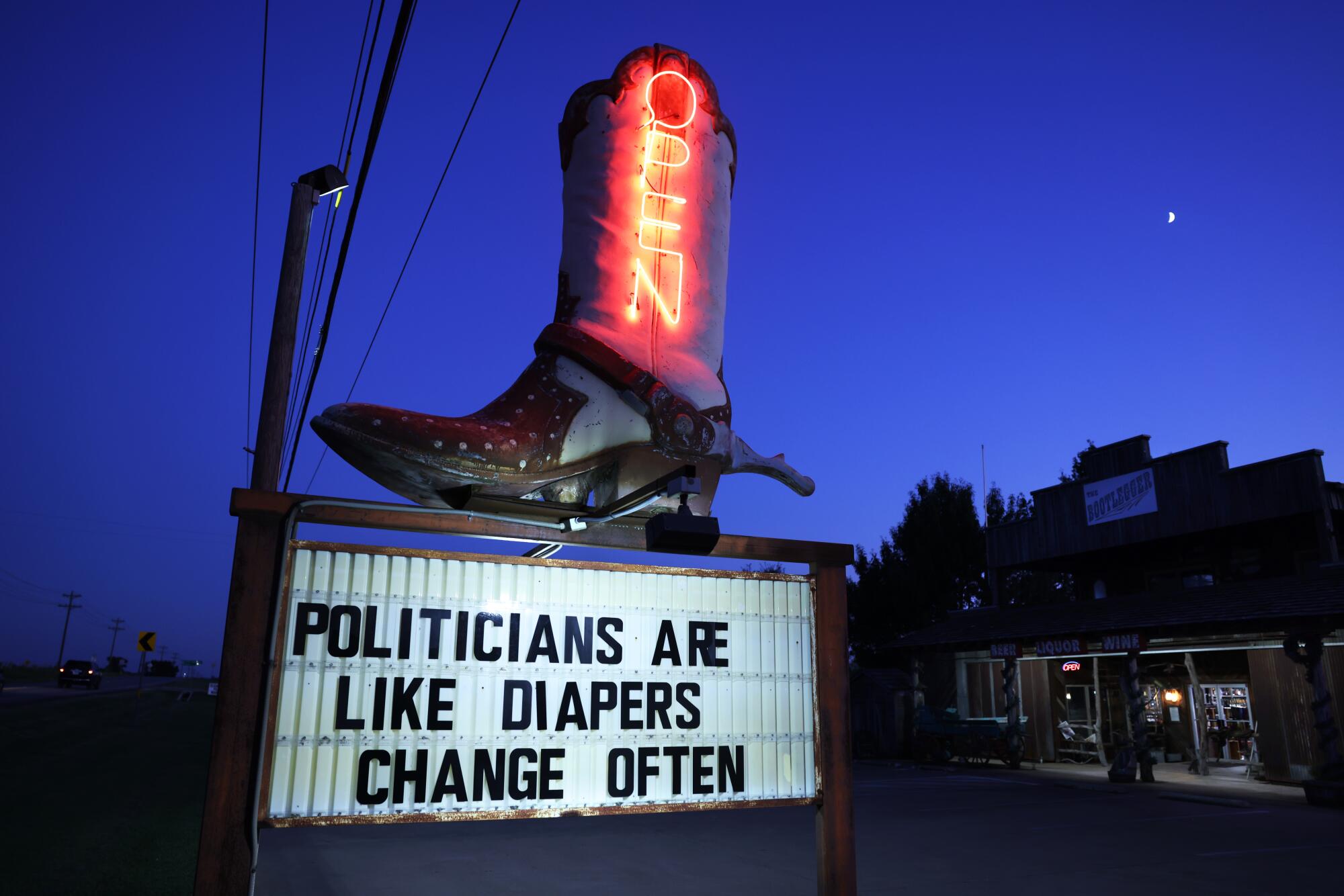
Fischer is a staunch conservative. Like many on the far right here, he calls himself a constitutionalist. He said the government reaches too deeply into people’s lives and that “a coup in this country happened” when President Woodrow Wilson led America into the world’s problems by signing the Treaty of Versailles, which led to the United Nations.
In 2021, amid the “Stop the Steal” clamor over Trump’s election loss, he orchestrated the resignation of elections administrator Michele Carew. He blamed her for not properly numbering ballots. She has said she was targeted, as were many election workers across the country, by the far right to give the Republican Party greater control to interfere with elections.

When asked whether the national election was stolen from Trump, who won by a landslide in Hood County, Fischer said “there were enough irregularities where it could have gone either way.” He added, though, “I very much abhorred Jan. 6. There’s no cause for violence.” He seemed sure of his convictions — “President Lincoln was terrible. I like Teddy Roosevelt but he set up the national parks, which is unconstitutional” — but unsettled by the divisions in his party and what he sees as a nation in debt and decline.
“We’ve been through the abortion and immigration battles. We’re in a massive moral decay, but that’s not going to take down the country. All of Western civilization is having this problem,” he said. “But I don’t know if we can survive as a country anymore. We’re adding $1.6 trillion to the debt every month. You can’t sustain that.”
Inside a courtroom about a mile away, a judge ruled in favor of the Republican Party’s far-right faction to appoint a new district clerk.